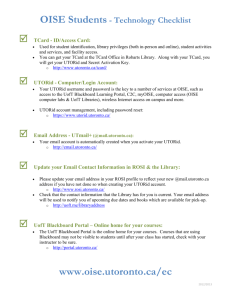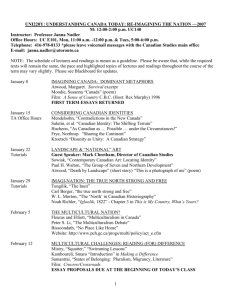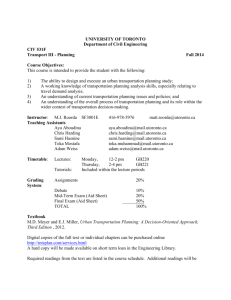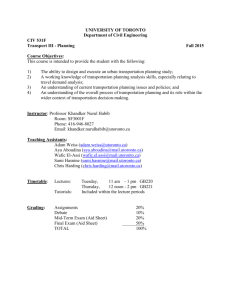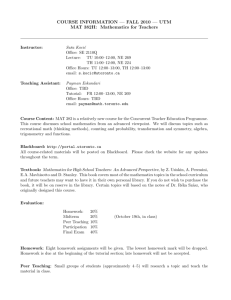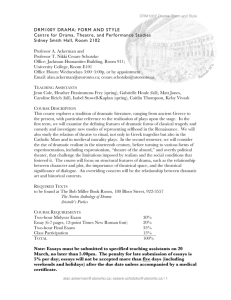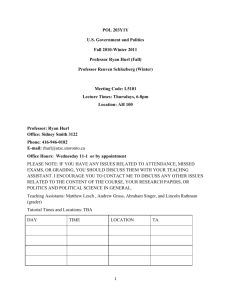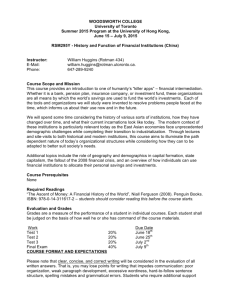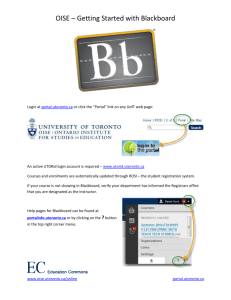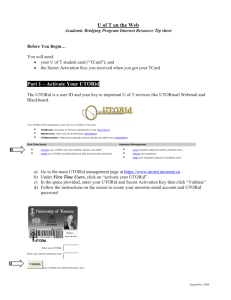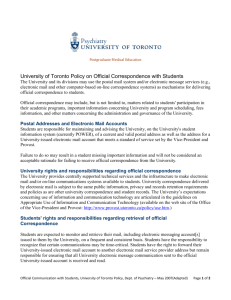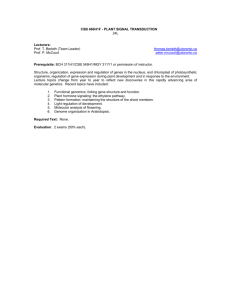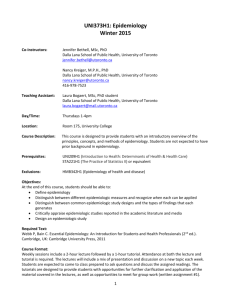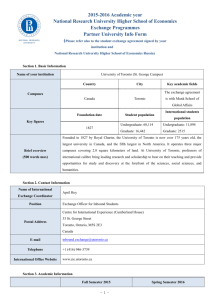EESB04 - Hydrology (2008)
advertisement
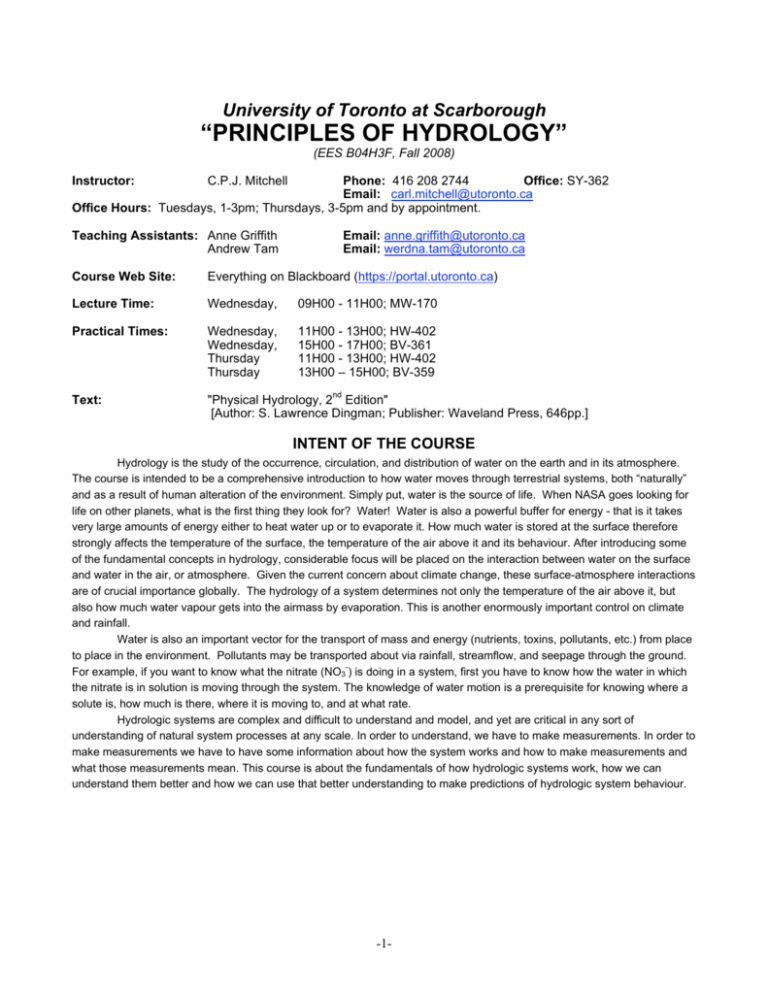
University of Toronto at Scarborough “PRINCIPLES OF HYDROLOGY” (EES B04H3F, Fall 2008) Instructor: C.P.J. Mitchell Phone: 416 208 2744 Office: SY-362 Email: carl.mitchell@utoronto.ca Office Hours: Tuesdays, 1-3pm; Thursdays, 3-5pm and by appointment. Teaching Assistants: Anne Griffith Andrew Tam Email: anne.griffith@utoronto.ca Email: werdna.tam@utoronto.ca Course Web Site: Everything on Blackboard (https://portal.utoronto.ca) Lecture Time: Wednesday, 09H00 - 11H00; MW-170 Practical Times: Wednesday, Wednesday, Thursday Thursday 11H00 - 13H00; HW-402 15H00 - 17H00; BV-361 11H00 - 13H00; HW-402 13H00 – 15H00; BV-359 Text: "Physical Hydrology, 2nd Edition" [Author: S. Lawrence Dingman; Publisher: Waveland Press, 646pp.] INTENT OF THE COURSE Hydrology is the study of the occurrence, circulation, and distribution of water on the earth and in its atmosphere. The course is intended to be a comprehensive introduction to how water moves through terrestrial systems, both “naturally” and as a result of human alteration of the environment. Simply put, water is the source of life. When NASA goes looking for life on other planets, what is the first thing they look for? Water! Water is also a powerful buffer for energy - that is it takes very large amounts of energy either to heat water up or to evaporate it. How much water is stored at the surface therefore strongly affects the temperature of the surface, the temperature of the air above it and its behaviour. After introducing some of the fundamental concepts in hydrology, considerable focus will be placed on the interaction between water on the surface and water in the air, or atmosphere. Given the current concern about climate change, these surface-atmosphere interactions are of crucial importance globally. The hydrology of a system determines not only the temperature of the air above it, but also how much water vapour gets into the airmass by evaporation. This is another enormously important control on climate and rainfall. Water is also an important vector for the transport of mass and energy (nutrients, toxins, pollutants, etc.) from place to place in the environment. Pollutants may be transported about via rainfall, streamflow, and seepage through the ground. For example, if you want to know what the nitrate (NO3-) is doing in a system, first you have to know how the water in which the nitrate is in solution is moving through the system. The knowledge of water motion is a prerequisite for knowing where a solute is, how much is there, where it is moving to, and at what rate. Hydrologic systems are complex and difficult to understand and model, and yet are critical in any sort of understanding of natural system processes at any scale. In order to understand, we have to make measurements. In order to make measurements we have to have some information about how the system works and how to make measurements and what those measurements mean. This course is about the fundamentals of how hydrologic systems work, how we can understand them better and how we can use that better understanding to make predictions of hydrologic system behaviour. -1- ASSESSMENT IN THE COURSE Mid-Term Test (October 22) Four Practicals worth 7.5% each Major Project Final Examination (Scheduled by Registrar) 15% 30% 20% 35% COURSE TEXT "Physical Hydrology" by Dingman, in the Bookstore. This book follows the course content relatively closely, but you are very well-served by attending each and every lecture. The very point of having a course taught to you (and not just reading a book) is the broader understanding, examples, and clarification that can be provided by your professor. The book is well-written and is very easy to understand. You will be glad that you got it, and if you ever do anything hydrologic again, you will be glad you kept it. All supplementary readings will be available online for free or through short-term loan in the library. The exact readings will be announced in class one week prior to the specific lecture and listed on Blackboard. MISSED TESTS/LATE PENALTIES FOR PRACTICALS Make-ups will not be given for the mid-term test. If you miss the test for a verifiable reason (i.e. you have a Doctor’s note) and/or if you have made provisions regarding the mid-term prior to it being conducted, the weight of the mid-term will be added to the weight of your final exam. Practical assignments are due on the dates shown in the above schedule. All practicals are due to your TA at the START of your practical time slot, except practical #4, which is due to Prof. Mitchell at the START of the last lecture of the year. The final project is due at the START of the Nov. 19 lecture to Prof. Mitchell. Late assignments and final projects will be penalized at a rate of 10%/day and will not be accepted after being 5 days late. INTERACTION WITH THE PROFESSOR AND TEACHING ASSISTANTS Professor Mitchell strongly encourages you to come to see him and speak with him about any facet of the course, portions you are having difficulty with, and things you found particularly interesting; all during his office hours (above) and/or immediately following class. He very much enjoys speaking with students about Hydrology. Your TA(s) also have office hours and you should take advantage of these for questions pertaining to your laboratory assignments. Neither Professor Mitchell nor the TA(s), however, will answer point-blank questions about specific questions on assignments, especially just prior to them being due. If you attend all lectures and all laboratories in an attentive manner, you should have little problem in completing excellent assignments, performing well on the mid-term, and completing a stellar project. Each and every student is expected to attend EVERY lecture. Professor Mitchell will not re-teach an entire class to someone because they missed it. Please rely on your fellow colleagues in the class for missing notes. Lecture slides will be posted on Blackboard, but little of what Professor Mitchell may “say” will actually be on those slides. Lecture slides are posted to facilitate your learning DURING lecture and for you to avoid having to, for example, copy large diagrams while you should be taking notes or listening. All lecture notes will be posted on the Blackboard at least 3 days prior to each scheduled lecture. Email policy: If at all possible, every effort should be made to meet, in person, with either Professor Mitchell or the TA(s) for questions pertaining to the course and assignments. Short emails will usually be answered with appropriate, short responses. Long, drawn out questions and/or questions pertaining to very general subjects, which are likely to be of interest to the entire class, should be posted on the Blackboard (Discussion Board module) so that the entire class may benefit from the answer. All emails should be sent via a “.utsc.utoronto.ca” or “.utoronto.ca” email address. Emails from other domains will likely be lost to spam filters and not responded to. Emails are responded to only on Tuesdays and Thursdays between 4 and 5 pm. -2- LECTURE OUTLINE / SCHEDULE DATE LECTURE CONTENT Sept. 10 Introduction, the Historical Development of Hydrology, and Some Basic Concepts in Hydrology Reading: Text, chapters 1 and 2. Sept. 17 Basic Concepts in Hydrology, Hydrological Quantities, and The Hydrological Cycle NON-CREDIT PRACTICAL Reading: Text, chapters 2, 3, and Appendix A. Sept. 24 Global Energy and Surface Radiation Balance, Precipitation, Interception and Throughfall PRACTICAL #1 THIS WEEK. Reading: Text, chapters 3, 4, and supplementary reading. Oct. 1 Snow, Snowmelt, Frozen Ground, and Glaciers Reading: Text, chapter 5 and supplementary reading. Oct. 8 Evapotranspiration and Soil Properties PRACTICAL #1 DUE. PRACTICAL #2 THIS WEEK. Reading: Text, chapters 7 and 6. Oct. 15 Infiltration and Groundwater Reading: Text, chapters 6 and 8. Oct. 22 Midterm (1 hour); Runoff and Streamflow I Reading: Text, chapter 9. Note, reading for this lecture is NOT on the mid-term! Oct. 29 Runoff and Streamflow II Reading: Text, chapter 9, Appendix F, and supplementary reading. Nov. 5 PRACTICAL #2 DUE. PRACTICAL #3 THIS WEEK. Hydrology in the Urban Context Reading: Supplementary reading. Nov. 12 Water Quality and Biogeochemistry Reading: Chapter 10, section 10.3 and supplementary reading. Nov. 19 Issues at the Watershed Scale PRACTICAL #3 DUE. PRACTICAL #4 THIS WEEK. MAJOR PROJECT DUE. Reading: Supplementary reading. Nov. 26 Case Study: Human Alteration of Hydrological Systems and Course Review (Last Class) Reading: Supplementary reading. -3- PRACTICAL #4 DUE. BLACKBOARD INFORMATION Logging in to your Blackboard Course Website Like many other courses, EESB04 uses Blackboard for its course website. To access the EESB04 website, or any other Blackboard-based course website, go to the UofT portal login page at http://portal.utoronto.ca and log in using your UTORid and password. Once you have logged in to the portal using your UTORid and password, look for the My Courses module, where you’ll find the link to the EESB04 course website along with the link to all your other Blackboard-based courses. Activating your UTORid and Password If you need information on how to activate your UTORid and set your password for the first time, please go to http://www.utorid.utoronto.ca. Under the “First Time Users” area, click on “activate your UTORid” (if you are new to the university) or “create your UTORid” (if you are a returning student), then follow the instructions. New students who use the link to “activate your UTORid” will find reference to a “Secret Activation Key”. This was originally issued to you when you picked up your Tcard at the library. If you have lost your Secret Activation Key you can call 416-978-HELP or visit the Help Desk at the Information Commons on the ground floor of Robarts Library to be issued a new one. The course instructor will not be able to help you with this. 416-978-HELP and the Help Desk at the Information Commons can also answer any other questions you may have about your UTORid and password. Email Communication with the Course Instructor At times, the course Instructor may decide to send out important course information by email. To that end, all UofT students are required to have a valid UofT email address. You are responsible for ensuring that your UofT email address is set up AND properly entered in the ROSI system. You can do that by using the following instructions: To submit the information to activate your UTORid and password (see above), you will need to click the “Validate” button. Follow the instructions on the subsequent screens to receive your utoronto.ca address. Once you have your UofT email address, go to the ROSI system (www.rosi.utoronto.ca), log in and update the system with your new UofT email address. You can check your UofT email account from 1. The UofT home page http://www.utoronto.ca: From the Quick Links menu on the top right, choose “my.utoronto.ca”. Enter your UTORid and password, and when the Welcome page opens, click “WEBMAIL”. 2. Email software installed on your computer, for example Microsoft Outlook or Mozilla Thunderbird. Visit the Help Desk at the Information Commons or call 416-978-HELP for help with the set up. Forwarding your utoronto.ca email to a Hotmail, Gmail, Yahoo or other type of email account is not advisable. In some cases, messages from utoronto.ca addresses sent to Hotmail, Gmail or Yahoo accounts are filtered as junk mail, which means that emails from your course instructor may end up in your spam or junk mail folder. You are responsible for: 1. Ensuring you have a valid UofT email address that is properly entered in the ROSI system 2. Checking your UofT email account on a regular basis. STUDENT CODE OF CONDUCT Please arrive promptly for lecture and do not forget to turn off cell phones and laptops. You are fully expected to abide by the Code of Student Conduct as set out by The Governing Council at the University of Toronto (http://www.utoronto.ca/govcncl/pap/policies/studentc.html). This document defines the standards by which students are to conduct themselves within class and within the University community at large. Please be advised that misconduct of any form will not be tolerated in this class. This includes plagiarism on tests, assignments, projects, and exams, which will be strictly enforced and is easily detected. If you have further questions regarding what constitutes plagiarism or other academic offences, feel free to speak with Prof. Mitchell or your TA. -4- SOME FINAL WORDS OF ADVICE This course is only moderately technically demanding (some of you may not agree entirely!), but there are plenty of things that will be unfamiliar, at least in the context of Hydrology. It is difficult to "crash and burn" because of the large number of elements in the course. It is, however (and for the same reason), a considerable task to maintain a high standard. You cannot do really well if you do very poorly on any element, so be vigilant: a really bad mid-term, for example, can make a difference of a whole letter grade to your final mark. -5-
